SUMEDHA, the wise man inherited a vast
fortune from his parents who left them upon their deaths. Realizing the
unsatisfactoriness he gave away his fortune and became an ascetic in the
forest. He soon gained mastery in meditation and was well known for his
supernormal powers.
.
. When
ascetic Sumedha knew of the coming of Dipankara Buddha to the city of
Rammavati, he took part in preparing the road for the Buddha. He was
still repairing it when the Buddha arrived but he was determined to
complete it by prostrating himself into the muddy hollow, in fulfillment
of his vow to become a Buddha. Beside him was a young lady named
Sumitta bearing eight stalks of lotus flowers. She gave the Ascetic five
stalks and kept for herself three stalks for her own aspiration. When
the Buddha Dipankara saw this, He omnisciently declared the Ascetic
Sumedha a future Buddha, while He stated that the aspiring young lady
Sumitta would be his constant companion and helpmate.
When
ascetic Sumedha knew of the coming of Dipankara Buddha to the city of
Rammavati, he took part in preparing the road for the Buddha. He was
still repairing it when the Buddha arrived but he was determined to
complete it by prostrating himself into the muddy hollow, in fulfillment
of his vow to become a Buddha. Beside him was a young lady named
Sumitta bearing eight stalks of lotus flowers. She gave the Ascetic five
stalks and kept for herself three stalks for her own aspiration. When
the Buddha Dipankara saw this, He omnisciently declared the Ascetic
Sumedha a future Buddha, while He stated that the aspiring young lady
Sumitta would be his constant companion and helpmate.
.
. The
Devas (Gods) imploring the Bodhisatta Santussita Deva (whose real name
was Setaketu) in Tusita heaven to be reborn on earth to become a Buddha.
He accepted their request after viewing the Five Great Considerations
(Panca Maha Vilokana); which are appropriate time, Island-continent,
country, clan and life-span of mother.
The
Devas (Gods) imploring the Bodhisatta Santussita Deva (whose real name
was Setaketu) in Tusita heaven to be reborn on earth to become a Buddha.
He accepted their request after viewing the Five Great Considerations
(Panca Maha Vilokana); which are appropriate time, Island-continent,
country, clan and life-span of mother.
.
. At
Lumbini Park in Nepal, on Vesakha Full Moon Day, the newly born Prince
walked seven steps on the lotus flowers and pointing to the North said,
“AGGOHAM ASMI LOKASSA” meaning “Chief Am I in this world”. The birth of
this baby Prince brought great joy to his royal parents, King Suddhodana
and Queen Maha Maya as well as all beings!
At
Lumbini Park in Nepal, on Vesakha Full Moon Day, the newly born Prince
walked seven steps on the lotus flowers and pointing to the North said,
“AGGOHAM ASMI LOKASSA” meaning “Chief Am I in this world”. The birth of
this baby Prince brought great joy to his royal parents, King Suddhodana
and Queen Maha Maya as well as all beings!
.
.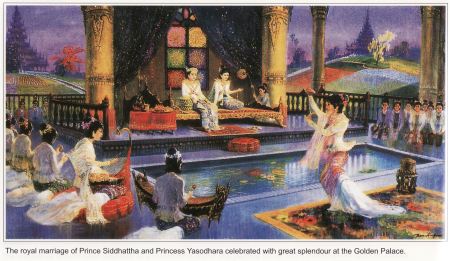 The
marriage of Prince Siddhattha and Princess Yasodhara (whose real name
was BaddaCancana ) took place at the Golden Palace which was presented
by his father, King Suddhodana. It was a luxurious palace full of
comforts of life . The celebration lasted many days.
The
marriage of Prince Siddhattha and Princess Yasodhara (whose real name
was BaddaCancana ) took place at the Golden Palace which was presented
by his father, King Suddhodana. It was a luxurious palace full of
comforts of life . The celebration lasted many days.
.
. During
his visit to the Royal park, Prince Siddhattha saw the Four Great
Signs, namely — an old man, a sick man, a corpse and a serene mendicant.
These made the Prince to realize the unsatisfactoriness of life and
urged him to ponder deeply about renunciation.
During
his visit to the Royal park, Prince Siddhattha saw the Four Great
Signs, namely — an old man, a sick man, a corpse and a serene mendicant.
These made the Prince to realize the unsatisfactoriness of life and
urged him to ponder deeply about renunciation.
.
. Mara
(the Evil One), with his host tried without success to prevent Prince
Siddhattha from his Great Renunciation at midnight . Prince Siddhattha
was riding on Kanthaka his fovourite stallion and followed by Channa his
loyal charioteer. Mara said that if the prince did not proceed on his
renunciation, he would become a Universal Monarch on the seventh day.
Mara
(the Evil One), with his host tried without success to prevent Prince
Siddhattha from his Great Renunciation at midnight . Prince Siddhattha
was riding on Kanthaka his fovourite stallion and followed by Channa his
loyal charioteer. Mara said that if the prince did not proceed on his
renunciation, he would become a Universal Monarch on the seventh day.
.
. Prince
Siddhattha cut off his hair to renounce the worldly life at the bank of
the Anoma River. Ghatikara Maha Brahma presented the Monk’s Eight
Requisites to Ascetic Siddhattha, who commanded his charioteer Channa to
take his royal chattels back to the palace.
Prince
Siddhattha cut off his hair to renounce the worldly life at the bank of
the Anoma River. Ghatikara Maha Brahma presented the Monk’s Eight
Requisites to Ascetic Siddhattha, who commanded his charioteer Channa to
take his royal chattels back to the palace.His hair was received by Sakka, King of Gods and enshirned in CULAMANI CETI (pagoda) in his celestial abode in TAVATIMSA. Similarly, Ghatikara Maha Brahma bore his princely clothes to his higher celestial abode, Akanittha and enshrined them in the pagoda known as DUSSA CETI.
.
. The
ascetic Bodhisatta spent six years practising austerity and meditation
with steadfastness as well as earnestness, prior to his attainment. Even
though he was reduced to a mere skeleton, he did not give up
practising.
The
ascetic Bodhisatta spent six years practising austerity and meditation
with steadfastness as well as earnestness, prior to his attainment. Even
though he was reduced to a mere skeleton, he did not give up
practising.
.
.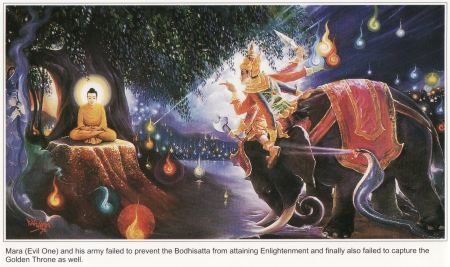 The
Bodhisatta was sitting on a Golden Throne under a Bodhi tree and being
challenged by Mara (the Evil One) riding on the ferocious elephant
Girimekhala. Mara with host tried to capture the Golen Throne just
before the Bodhistta’s Enlightenment.
The
Bodhisatta was sitting on a Golden Throne under a Bodhi tree and being
challenged by Mara (the Evil One) riding on the ferocious elephant
Girimekhala. Mara with host tried to capture the Golen Throne just
before the Bodhistta’s Enlightenment.
.
.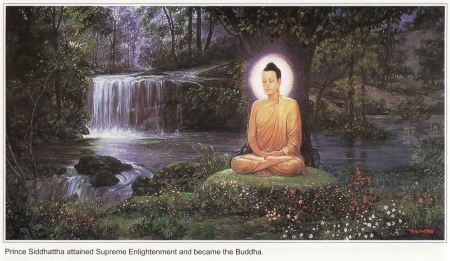 On
Vesakha Full Moon day, Bodhisatta Siddhattha seated under a Bodhi tree
at Gaya, attained Supreme Enlightement. On the first watch of the night
he gained knowledge by which He remembered past lives. On the second
watch of the night he was able to see into the future including the
birth and death of other beings. On the third watch of the night, He
destroyed all defilements and became a Fully Enlightened One
(Samma-Sambuddha).
On
Vesakha Full Moon day, Bodhisatta Siddhattha seated under a Bodhi tree
at Gaya, attained Supreme Enlightement. On the first watch of the night
he gained knowledge by which He remembered past lives. On the second
watch of the night he was able to see into the future including the
birth and death of other beings. On the third watch of the night, He
destroyed all defilements and became a Fully Enlightened One
(Samma-Sambuddha).
.
.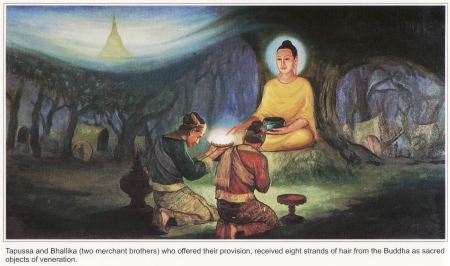 It
was in the final week (7th week) after his Enlightenment, when the two
merchant brothers Tapussa and Bhallika from Ukkalapa passed by the spot
and saw the Buddha. They offered the Buddha their own provision; then
the Buddha gave eight strands of hairs from His head for them to worship
as sacred objects of veneration.The hair relics are now enshrined in
the Shwedagon Pagoda in Yangon, Myanmar.
It
was in the final week (7th week) after his Enlightenment, when the two
merchant brothers Tapussa and Bhallika from Ukkalapa passed by the spot
and saw the Buddha. They offered the Buddha their own provision; then
the Buddha gave eight strands of hairs from His head for them to worship
as sacred objects of veneration.The hair relics are now enshrined in
the Shwedagon Pagoda in Yangon, Myanmar.
.
. At
the Deer Park at Varanasi, the Buddha met the five ascetics, Kondanna,
Vappa, Bhaddiya, Mahanama and Assaji all of whom He had known before .He
delivered His first sermon to them. It is called the
Dhammacakkapavattana Sutta which sets the wheel of the Dhamma in motion.
The ascetic Kondanna who was at His childhood Name-giving Ceremony
became the first to see light in the Dhamma and attained Sotapanna, the
first stage of Sainhood.
At
the Deer Park at Varanasi, the Buddha met the five ascetics, Kondanna,
Vappa, Bhaddiya, Mahanama and Assaji all of whom He had known before .He
delivered His first sermon to them. It is called the
Dhammacakkapavattana Sutta which sets the wheel of the Dhamma in motion.
The ascetic Kondanna who was at His childhood Name-giving Ceremony
became the first to see light in the Dhamma and attained Sotapanna, the
first stage of Sainhood.Later, all attained Arahantship after hearing the Anatalakkhana Sutta (the Discourse which deals with No-Self)
.
.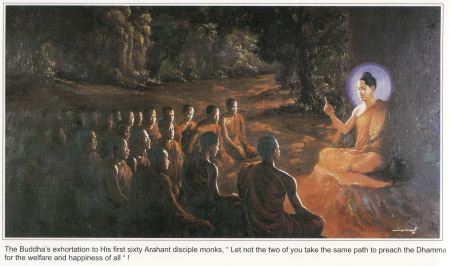 The
Buddha exhorted His first sixty Arahant disciples to go forth in
different directions to preach the Doctrine, using these famous words: –
“Go ye, 0 bhikkhus and wander forth for the gain of many, for the
welfare of the many, in compassion for the world, for the good, for the
gain, for the welfare of the Devas (Gods) and men . Proclaim ye, 0
Bhikkhus! The Doctrine that is glorious and preach ye a life of
holiness, perfect and pure!”
The
Buddha exhorted His first sixty Arahant disciples to go forth in
different directions to preach the Doctrine, using these famous words: –
“Go ye, 0 bhikkhus and wander forth for the gain of many, for the
welfare of the many, in compassion for the world, for the good, for the
gain, for the welfare of the Devas (Gods) and men . Proclaim ye, 0
Bhikkhus! The Doctrine that is glorious and preach ye a life of
holiness, perfect and pure!”
.
.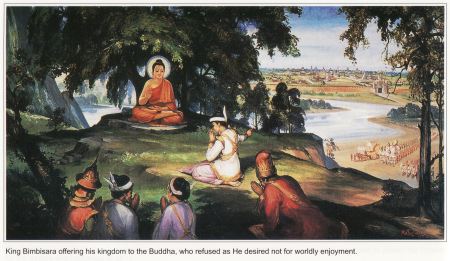 When
the Bodhisatta visited Rajagaha, the capital of Magadha, King Bimbisara
offered his Kingdom to the Bodhisatta. But He did not accept it because
of the worldly pleasures. After listening to the preaching of Buddha,
the King attained the first stage of Sainthood (Sotapanna). He then
dedicated his Royal park known as Veluvana (Bamboo Grove) to the Buddha
and His disciples.
When
the Bodhisatta visited Rajagaha, the capital of Magadha, King Bimbisara
offered his Kingdom to the Bodhisatta. But He did not accept it because
of the worldly pleasures. After listening to the preaching of Buddha,
the King attained the first stage of Sainthood (Sotapanna). He then
dedicated his Royal park known as Veluvana (Bamboo Grove) to the Buddha
and His disciples.
.
.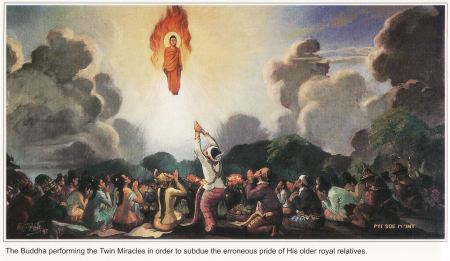 The
Buddha performed the Twin Miracles of emitting fire and water
simultaneously from His body, to subdue the pride of his older relatives
who had erroneously thought that the Buddha being the younger would
have to show respects to them.
The
Buddha performed the Twin Miracles of emitting fire and water
simultaneously from His body, to subdue the pride of his older relatives
who had erroneously thought that the Buddha being the younger would
have to show respects to them.
.
. On
the seventh day after his arrival in Kapilavatthu, Princess Yasodhara
dressed up Prince Rahula and pointing to the Buddha said, “Behold, son,
the great Ascetic of majestic appearance is your father. Go up to him
and ask for your inheritance!”
On
the seventh day after his arrival in Kapilavatthu, Princess Yasodhara
dressed up Prince Rahula and pointing to the Buddha said, “Behold, son,
the great Ascetic of majestic appearance is your father. Go up to him
and ask for your inheritance!”As advised by his mother, young Rahula came to His presence and asked for his inheritance. Instead, the Buddha told Venerable Sariputta to ordain Prince Rahula , giving him a spiritual inheritance better than the one he asked for.
.
.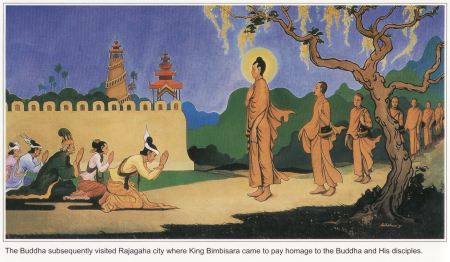 During
a subsequent visit to Rajagaha City, the Buddha went for alms-round in
the company of His Chief Disciples and other monks. Along the way King
Bimbisara and his royal family paid repects to the Buddha and His
disciples.
During
a subsequent visit to Rajagaha City, the Buddha went for alms-round in
the company of His Chief Disciples and other monks. Along the way King
Bimbisara and his royal family paid repects to the Buddha and His
disciples.
.
. The
Buddha delivering a sermon of peace to two powerful warning armies of
Kapilavatthu and Koliya at the opposite banks of the Rohini river before
the two countries started fighting for the water supply of the river,
for pastoral use.
The
Buddha delivering a sermon of peace to two powerful warning armies of
Kapilavatthu and Koliya at the opposite banks of the Rohini river before
the two countries started fighting for the water supply of the river,
for pastoral use.
.
.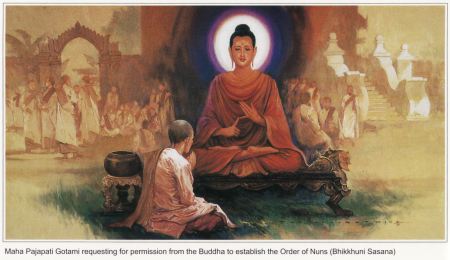 The
Order of Nuns (Bhikkhuni Sasana) was founded in the fifth year of the
Buddha’s Enlightenment. After the death of King Suddhodana, Maha
Pajapati Gotami , who was His former foster mother desirous of joining
the Order ,approached the Buddha who was then, residing at Kapilavathu
and begged permission for women to be admitted into the Order. After
hearing and turning down their pleas, Buddha returned to Vesali for the
Rains Retreat . Undaunted by the rebuff, Maha Pajapati Gotami cut off
her hair and wearing yellow garments went on foot to Vesali, accompanied
by many other Sakyan ladies. They stood outside the porch of the
Pinnacled Great Hall in Mahayana where the Buddha was residing.
Interceded by Venerable Ananda , the Buddha finally consented to
establish the Bhikkhuni Sasana when Maha Pajapati Gotami and other
Sakyan ladies agreed to observe the Eight Disciplinary Rules for nuns.
Henceforth Maha Pajapati Gotami and other Sakyan ladies were admitted
into the Order.
The
Order of Nuns (Bhikkhuni Sasana) was founded in the fifth year of the
Buddha’s Enlightenment. After the death of King Suddhodana, Maha
Pajapati Gotami , who was His former foster mother desirous of joining
the Order ,approached the Buddha who was then, residing at Kapilavathu
and begged permission for women to be admitted into the Order. After
hearing and turning down their pleas, Buddha returned to Vesali for the
Rains Retreat . Undaunted by the rebuff, Maha Pajapati Gotami cut off
her hair and wearing yellow garments went on foot to Vesali, accompanied
by many other Sakyan ladies. They stood outside the porch of the
Pinnacled Great Hall in Mahayana where the Buddha was residing.
Interceded by Venerable Ananda , the Buddha finally consented to
establish the Bhikkhuni Sasana when Maha Pajapati Gotami and other
Sakyan ladies agreed to observe the Eight Disciplinary Rules for nuns.
Henceforth Maha Pajapati Gotami and other Sakyan ladies were admitted
into the Order.Later, the Nuns Khema and Uppalavanna were appointed the two Chief female Disciples; as were Sariputta and Moggalana the two Chief Male Disciples.
.
. After
losing in lively debate, the haughty hermit Saccaka refused to answer
accordingly when the Buddha asked a question. Only when he was
threatened to be beaten up by a celestial demon for arrogance, only then
did he finally realize his own folly and listened to the Buddha’s
preaching meekly. This wholesome action of his would augur well for his
future.
After
losing in lively debate, the haughty hermit Saccaka refused to answer
accordingly when the Buddha asked a question. Only when he was
threatened to be beaten up by a celestial demon for arrogance, only then
did he finally realize his own folly and listened to the Buddha’s
preaching meekly. This wholesome action of his would augur well for his
future.
.
.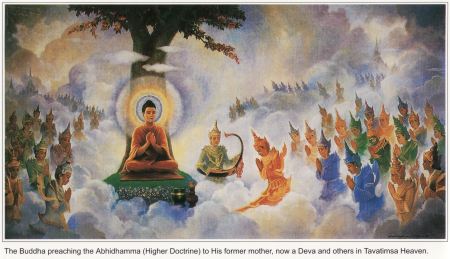 On
the seventh year after His Enlightenment, the Buddha preached the
Abhidhamma (higher Doctrine) in Tavatimsa Heaven. As a fulfillment of
gratitude to his former mother, now a Santussita deva, the Buddha then
delivered a sermon on the Higher Doctrine to thousands of Devas (Gods)
and Brahmas (higher celestial beings) who attained the various stages of
Noble Sainthood.
On
the seventh year after His Enlightenment, the Buddha preached the
Abhidhamma (higher Doctrine) in Tavatimsa Heaven. As a fulfillment of
gratitude to his former mother, now a Santussita deva, the Buddha then
delivered a sermon on the Higher Doctrine to thousands of Devas (Gods)
and Brahmas (higher celestial beings) who attained the various stages of
Noble Sainthood.
.
.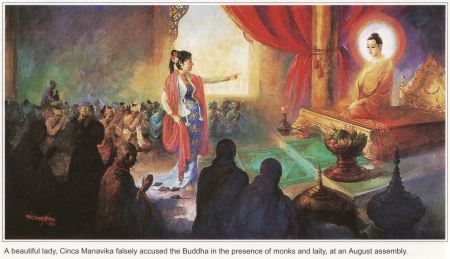 The
non Buddhist sectarians grudgingly wanted to ruin the Buddha’s
reputation. They told Cinca Manvika , a beautiful girl to falsely accuse
the Buddha for her shamed, pregnancy in a big and august assembly. King
of Devas (Gods) dispatched some Deities disguised as mice to gnaw
through the strings holding a block of wood under her garment. Her plot
was exposed when the wood fell on her feet. When the people saw that,
they threw stones and chased her away. As she was walking away, the
earth spilt open and a flame sprang up to envelop and drag her down to
Avici (deepest and worst) Hell.
The
non Buddhist sectarians grudgingly wanted to ruin the Buddha’s
reputation. They told Cinca Manvika , a beautiful girl to falsely accuse
the Buddha for her shamed, pregnancy in a big and august assembly. King
of Devas (Gods) dispatched some Deities disguised as mice to gnaw
through the strings holding a block of wood under her garment. Her plot
was exposed when the wood fell on her feet. When the people saw that,
they threw stones and chased her away. As she was walking away, the
earth spilt open and a flame sprang up to envelop and drag her down to
Avici (deepest and worst) Hell.
.
.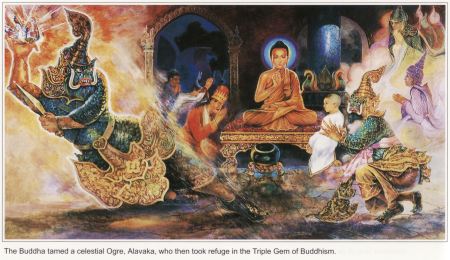 On
the sixteenth year of His Enlightment, the Buddha tamed the carnivorous
Demon King , Alavaka who feasted on human flesh, to give up his habit
on devouring at least one human being everyday. After hearing the
Buddha’s Teaching, he henceforth gave up his habit, thus sparing the
small child offered to him as food on that day.
On
the sixteenth year of His Enlightment, the Buddha tamed the carnivorous
Demon King , Alavaka who feasted on human flesh, to give up his habit
on devouring at least one human being everyday. After hearing the
Buddha’s Teaching, he henceforth gave up his habit, thus sparing the
small child offered to him as food on that day.
.
. There
was a young harmless student at TAKKASILA University called Ahimsa. His
jealous fellow students poisoned the mind of their teacher against him.
As a result the teacher asked Ahimsa for a garland of one thousand
right index fingers as tuition fee. Eager to discharge his obligation,
he went into the Jalini forest in Kosala and started to waylay the
passing travellers to collect an index finger from the right hand of
each victim. The garland was almost completed except for one more single
finger. Ahimsa decided to kill even his own mother for the sake of
completing the one thousandth finger in the garland. However, Ahimsa was
intercepted by the Compassionate Buddha who came to his aid. After
listening to His preaching and being convinced, Ahimsa now known as
Angulimala (garland of fingers ) joined the Sangha and became a Bhikkhu
(monk) . The Angulimala Sutta, a discourse ascribed to this Thera
(elder/monk) and connected to this event, is well-known in Buddhist
countries and often used by pregnant ladies in travail for easy and safe
delivery.
There
was a young harmless student at TAKKASILA University called Ahimsa. His
jealous fellow students poisoned the mind of their teacher against him.
As a result the teacher asked Ahimsa for a garland of one thousand
right index fingers as tuition fee. Eager to discharge his obligation,
he went into the Jalini forest in Kosala and started to waylay the
passing travellers to collect an index finger from the right hand of
each victim. The garland was almost completed except for one more single
finger. Ahimsa decided to kill even his own mother for the sake of
completing the one thousandth finger in the garland. However, Ahimsa was
intercepted by the Compassionate Buddha who came to his aid. After
listening to His preaching and being convinced, Ahimsa now known as
Angulimala (garland of fingers ) joined the Sangha and became a Bhikkhu
(monk) . The Angulimala Sutta, a discourse ascribed to this Thera
(elder/monk) and connected to this event, is well-known in Buddhist
countries and often used by pregnant ladies in travail for easy and safe
delivery.
.
.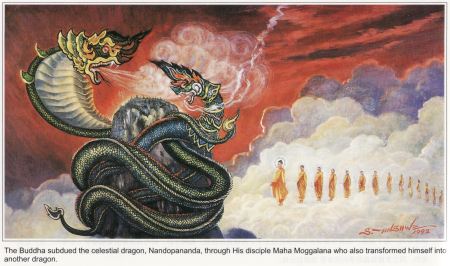 Once
the Buddha and His Disciples went to Lake Anotatta passing by the
mansion of Nandopananda the dragon king who was enjoying himself with
his retinue. Angry at the apparent trespassing, Nandopananda coiled
itself seven times round Mount Meru, covered the summit with its hood
and spewing hot poisonous smoke to prevent the Buddha and his disciples
from reaching lake Anotatta. Thereupon Maha Moggalana, (the second Chief
Disciple) at once transformed himself into a dragon and likewise coiled
round the mountain, crushing Nandopananda. Watched by the Buddha and
His disciples, Maha Moggalana too began spewing hot poisonous smoke
which greatly distressed Nandopananda who soon lost the challenge and
upon realization of his folly, sought refuge in the Triple Gem of
Buddhism.
Once
the Buddha and His Disciples went to Lake Anotatta passing by the
mansion of Nandopananda the dragon king who was enjoying himself with
his retinue. Angry at the apparent trespassing, Nandopananda coiled
itself seven times round Mount Meru, covered the summit with its hood
and spewing hot poisonous smoke to prevent the Buddha and his disciples
from reaching lake Anotatta. Thereupon Maha Moggalana, (the second Chief
Disciple) at once transformed himself into a dragon and likewise coiled
round the mountain, crushing Nandopananda. Watched by the Buddha and
His disciples, Maha Moggalana too began spewing hot poisonous smoke
which greatly distressed Nandopananda who soon lost the challenge and
upon realization of his folly, sought refuge in the Triple Gem of
Buddhism.
.
.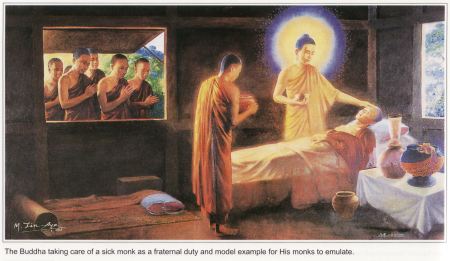 The
Buddha taking care of a sick monk, named Tissa who had been neglected
by his unthoughtful fellow monks. By so doing, the Buddha wanted to
foster mutual care and welfare amongst the Bhikkhus as well as others.
The
Buddha taking care of a sick monk, named Tissa who had been neglected
by his unthoughtful fellow monks. By so doing, the Buddha wanted to
foster mutual care and welfare amongst the Bhikkhus as well as others.
.
. Baka
Brahma, who was bitten by the snake of tenacious heresay (in believing
that the Brahma Loka is the best and everlasting world in existence) ,
was duly defeated by the Buddha in a mutual contest to show power. On
hearing the Buddha’s profound expounding of the Dhamma (Buddhist
Doctrine), he became enlightened along with many other Brahmas (higher
celestial beings).
Baka
Brahma, who was bitten by the snake of tenacious heresay (in believing
that the Brahma Loka is the best and everlasting world in existence) ,
was duly defeated by the Buddha in a mutual contest to show power. On
hearing the Buddha’s profound expounding of the Dhamma (Buddhist
Doctrine), he became enlightened along with many other Brahmas (higher
celestial beings).
.
.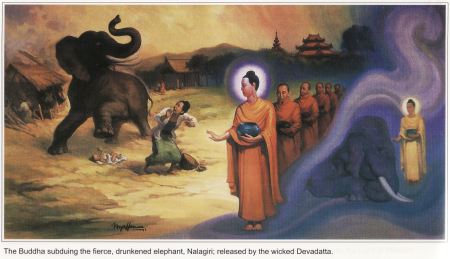 When
the Buddha was on his way to the city of Rajagaha, Devadatta ordered
the release of the fierce elephant, Nalagiri, to harm Him. As the
elephant charged towards the Buddha, everyone ran away leaving a mother
and her baby on the ground. The Buddha radiated His infinite Compassion
to calm and subdued the elephant before it could trample the helpless
baby.
When
the Buddha was on his way to the city of Rajagaha, Devadatta ordered
the release of the fierce elephant, Nalagiri, to harm Him. As the
elephant charged towards the Buddha, everyone ran away leaving a mother
and her baby on the ground. The Buddha radiated His infinite Compassion
to calm and subdued the elephant before it could trample the helpless
baby.
.
.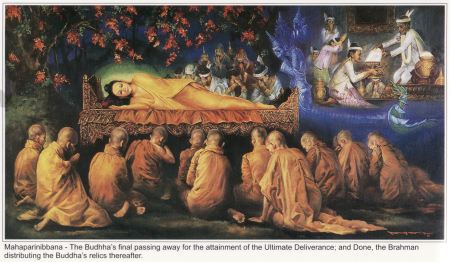 1.
The Buddha at Kusinara laid himself between two Sal trees with his head
to the North, determined not to rise again. He them delivered his last
admonition, “Behold, 0 Disciples! I exhort you ! Subject to change are
all component things! Strive on with Diligence !” before He entered Maha
parinibbana (attainment of Final Emancipation).
1.
The Buddha at Kusinara laid himself between two Sal trees with his head
to the North, determined not to rise again. He them delivered his last
admonition, “Behold, 0 Disciples! I exhort you ! Subject to change are
all component things! Strive on with Diligence !” before He entered Maha
parinibbana (attainment of Final Emancipation).2. Dona , the Brahman divided the Buddha’s relics into eight equal portions and distributed each of them to the Rulers of the eight countries. Then Dona decided that the golden container be kept for himself as an object of respectful veneration.
.
